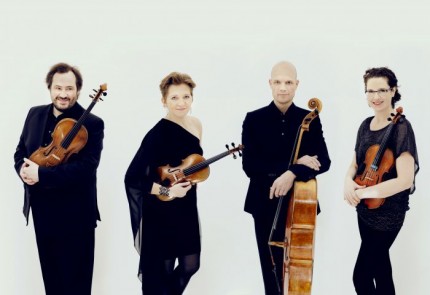Artemis Quartet excels in belated Chicago debut
The Berlin-based Artemis Quartet made its Chicago debut at Mandel Hall Friday night as part of the University of Chicago Presents concert series. Less than a year ago, the ensemble experienced a devastating loss with the sudden tragic death of their longtime violist Friedemann Weigle.
After Weigle’s passing Artemis’ second violinist Gregor Sigl switched over to viola. Chicago native Anthea Kreston filled the resulting vacancy at second violin, making Friday’s concert both a debut and something of a homecoming.
Friday’s electrifying performance by the retooled and transfigured quartet was a testament to the adaptability and consummate musicianship of its current members.
The evening opened with Hugo Wolf’s effervescent Italian Serenade as a curtain raiser. First violinist Vineta Sareika, Kreston, and Sigl all stood throughout the performance, with cellist Eckart Runge performing from a foot-high podium. The freedom of movement and communication this setup can foster was immediately apparent, with the Artemis members blithely passing Wolf’s coquettish phrases amongst each other. A highlight was Runge’s brash central cello solo, which had the ardor of a Mezzogiorno vacation affair.
Janáček’s String Quartet No. 1 “The Kreutzer Sonata,” was not named after Beethoven’s famed violin sonata, but after Tolstoy’s short story of love, paranoia, and murder. The Artemis Quartet channeled the emotional world of Tolstoy’s characters, bringing palpable anguish to the opening Adagio; Con moto, and an elemental fierceness to its disjointed eruptions. Each of the four movements has a marking of “Con moto,” and the performance proceeded with the precipitous inevitability of Tolstoy’s narrative.
The second movement’s grinding sul ponticello passages had the deranged commitment of a man truly obsessed; likewise, and the Artemis’ schizoid rendering of the third movement’s juxtaposed lyricism and aggression was a compelling portrayal of psychological conflict. Kreston gave her frenetic accompaniment figures in the final movement a searing treatment, and the death throes of the work’s final bars sounded genuinely morbid after the twisted drama that preceded them.
One stylistic inconsistency was noticeable in both the Wolf and Janáček, with conspicuously different aesthetics from the two violinists, Sareika and Kreston. Both are superlative players, but throughout Kreston played more assertively and with a more robust timbre than her first violin counterpart, whose playing was by comparison more lean and understated. The result was that at its louder dynamics the ensemble often sounded not necessarily bottom-heavy, but top-light, if you will.
This trend continued but in somewhat more balanced fashion in the last work on the program, Beethoven’s “Razumovsky” Quartet in F Major, Op. 59, no. 1. The opening Allegro was played with poise and an expansive sheen, yet jagged when the music indicated. The obsessive ostinato in the Allegretto vivace scherzando never became grating as the quartet infused it with a variety of subtle guises and inflections. Eloquent solos from Sareika and Runge highlighted the exquisite pathos of the Adagio, and the closing movement had an infectious Slavic athleticism.
The next performance in the University of Chicago Presents classic concert series will take place at 3 p.m. April 24 at the Logan Center for the Arts. The University’s outgoing ensemble-in-residence, the Pacifica Quartet will perform Mozart’s String Quartet in G Major, K. 387, Shostakovich’s String Quartet No. 11 in F Minor, Op. 122, and Beethoven’s String Quartet in C-sharp Minor, Op. 131. https://chicagopresents.uchicago.edu/
Posted in Performances





